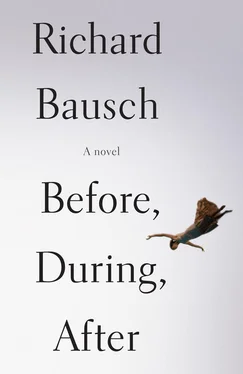The old man sighed. “I meant now that you’re more free to travel. Come on, boy. Quit interpreting everything I say. I’d like you to drive over to see us.”
“We’ll do that. You coming to our wedding?”
“If we can. When is it?”
“Early next month.”
“Give me some notice.”
“This is it.”
“You want to give me a definite date, Son?”
“I will. Of course. Promise.”
Faulk sat with the phone at his ear, picturing the old man in his television room leaning back in the easy chair amid all the law books he never looked in anymore, with a movie paused on the VCR, anxious to get off the line.
“Not everything I say is intended as a criticism,” Leander said.
Faulk apologized, meaning it.
“Just sometimes,” said the old man with a cheerless little snickering sound.
“Right,” Faulk said. “Well, I’m home.”
“Good.”
“I’ll call you when it’s set.”
As long as he could remember, a barrier had existed between them. Periodic conflict about religion kept flaring up in the house, and according to the old man, Faulk was more his mother’s child. Marilyn Dealey Faulk was quite austere in observance, while Leander had, as she said of him, no covenant with anything but the hours of the day. From Faulk’s earliest memories they quarreled about the discrepancy. The old man would say that Marilyn’s pietistic attitudes and habits never kept her from feeling murderous resentment over some real or imagined slight. According to him, she was only interested in those superficial elements of Christian living that permitted the slaughters and terrors of the world to continue, all in the name of God. Onward, Christian soldiers . He would whistle the old hymn, just to needle her.
Marilyn never flagged in espousing the age-old, Bible-haunted tenets that had traveled down the generations from culture to culture; she was very strong in her belief.
They were, then, in fundamental disagreement about the whole human journey.
Even so, they generally went for periods looking like a settled couple in the calming waters of habit. If you paid attention, you might observe that there wasn’t much affection between them — not much of that kind of warmth emanating from intimacy when intimacy is easy and relaxed — but only a form of detached consideration. To others, they seemed normal. But Faulk always had the feeling that something was brooding under the surface kindness and the usual staid rituals of family life. He had no way to express this at the time, but it was a feeling strong enough and steady enough to last until he did have language for it. The boy, precocious, unsure and uneasy and watchful of every little fault line between them, was full of anxiety all the time that they might fly apart, like shards from a shattered window. This was when he learned to fear the insubstantial stirrings that lurked in the dark of what people refused to look at: the ways in which thought could injure you. He watched his parents go through their days, rarely affected and seemingly oblivious to the damages resulting from the passions that arose when they did fight. And any fight, invariably, was about religion. Always, the religion. In one of those conflicts, the old man said forcefully, at the top of his thin voice, that he wanted something from his son to shore up what he called the puny remnants of sanity in the house. His house. Faulk sided with his mother, because he feared his father, and he had nowhere else to go.
He took to retreating into himself whenever Leander was near. By the time he was in his teens, Christianity, with its rituals, and more important its literature, had become a sort of haven for him, and he spent hours reading through Hooker, Bonhoeffer, Duns Scotus, Tillich, Kierkegaard, the mystics, and, finally, especially, Aquinas— The Summa Theologica —that massive intellectual construction explaining all the knotty inconsistencies and the shadowy grottoes and crevices of faith in the world. All that, and of course he never thought of any of it as refuge, not back then; he never perceived it as any kind of withdrawal from the realities of the house where he lived. Yet he was perpetually a boy in hiding, buried, separated — even from himself.
Later, during his journey away, through the years of study and absorption in college and then at seminary, there were days and sometimes weeks when he experienced the same emotional detachment that he believed came from his parents — a malaise, even a form of paralysis, doing things automatically: a pair of eyes, two hands, a creature sleeping and feeding, someone absorbed in reading and study, feeling nothing. And recalling Sartre’s comment about hell being other people, he thought he understood the feeling; hell was being aware of one’s separation from other people — who looked discouragingly like specimens, so far from him as to seem somehow not of his kind.
How he had hated it.
After his ordination, he took on the busy life of his first assigned parish, and that element of his being seemed to have gone the way of other youthful troubles. He grew out of it, probably by the simple pressure of what there was to do. When he met Joan, shortly after coming to Memphis, he was already far past that time; it was an old memory then.
Except that of course it was what had led him to leaving the priesthood. And it was with him now, this disquiet: he could not bring himself to care about much of anything , not in the way that you normally associated feeling. Things happened to you and around you and what you felt stayed; it was almost a kind of sustenance. But when that failed, what you were left with was the waiting for the next thing. Even the terrors of the catastrophe, all that, even that, left him strangely anesthetized. Suddenly, it seemed, he was someone only reacting, an onlooker, attending to his own discomforts, and in a sort of suspension about all the rest, waiting to see an outcome that did not exist.
Natasha was the answer to all that. The bright center of everything.
And now he realized that the apartment smelled of the cleansers he had used, so he made another trip out to find some scented candles and to get some coffee. She liked the smell of coffee. Back in the apartment, he lit the candles, brewed coffee, and then sat by the window, drinking it.
8
She woke before first light after a static interval of half sleep, and for a little while she tried to go back. When the sound reached her of Constance struggling out into the hall with her luggage, she thought of getting up to go thank her and to say something else — perhaps even to apologize, complicated as that would be. A moment later, she rose and went to the door, opened it, and called out the name. Constance was gone. The sun had risen and the day was heating up. Some people were already out on the beach.
She was packed. She had the clothes that she would wear — jeans and a white blouse — on the chair next to the bed. A wave of panic came over her as she put them on, and she sat back down on the bed, arms wrapped tightly around her middle, rocking back and forth and trying to breathe slowly. Finally she opened the minibar, took one of the bottles of whiskey out, and drained it in two stinging gulps. Then she was in the bathroom, coughing and spitting into the sink.
When she had gathered herself and patted cold water on her cheeks, she stood out on the balcony and breathed the humid air with its fragrance of cooked sausage and bacon. She was not remotely hungry. At last she moved to the door and into the hall. There was a note taped just below the room number.
I’ll miss you. Really sorry about everything. Please call when you get to Memphis?
Love, Constance
Downstairs, the lobby was nearly empty. A van waited to take people to the airport. In the van already, in the far back, was Skinner, with his wife. Skinner looked very pale and tired. He had a bandage on one heavy arm and another above his left eye. He nodded at Natasha but did not speak. Mrs. Skinner stared straight ahead, hands clenched tightly in her lap. Ratzi drove, and he, too, was silent, even sullen, watching the road with an air of overfamiliarity and boredom, and seemingly far away in his thoughts. Natasha looked out at the sea and sky through the placid stillness of the palms.
Читать дальше












